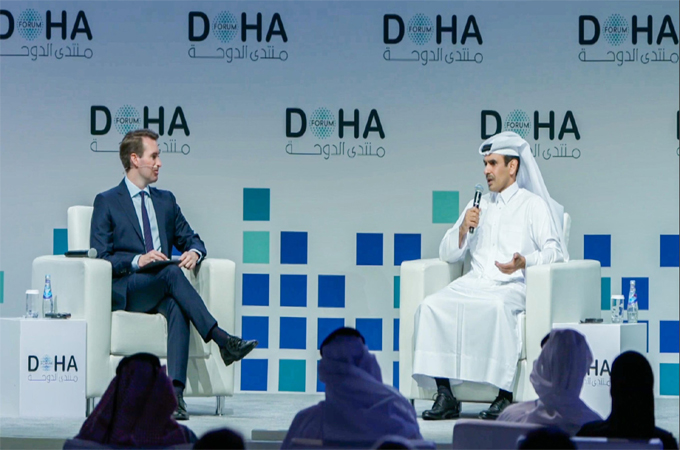Saad Al-Kaabi, the Minister of State for Energy Affairs, the President and CEO of QatarEnergy, said Qatar stands in total support of the concept of the European Union’s (EU) Corporate Sustainability Due Diligence Directive (CS3D), and of the desire to protect and uphold human rights, labor rights, and reducing environmental impact. “However,” he added, “the issue is how you go about it.”
In remarks during a “Newsmaker Interview” as part of the Doha Forum 2024, held in Doha, Minister Al-Kaabi criticised the directive as “making absolutely no sense.”
“This directive affects any company that deals in Europe and makes more than €450 million generated in or from Europe. So, companies like QatarEnergy, Shell, or ExxonMobil and even car companies like Toyota or GM, will have to say they will abide by the Paris Accords. So, the company will have to commit to Net Zero,” he explained.
“For us as QatarEnergy, and with all the expansions we are undertaking, I can assure you we cannot meet Net Zero as a company.”
He added: “The second thing is that we need to make sure we put a team of probably a thousand people in QatarEnergy whose dedicated job would be to go and look at all our subsidiaries and suppliers around the world, because if there is a nail or a screw that we buy from a contractor who has a subcontractor, we will be responsible for looking into their practices and would get penalised for that.”
Minister Al-Kaabi said: “We are also asked to be responsible for tier emissions 1, 2, and 3 and be liable for a penalty of up to 5% of our total generated revenue worldwide. This makes absolutely no sense. So, my message to Europe and to the EU Commission is: Are you telling us that you don't want our LNG into the EU? Because I sure am not going to supply the EU with LNG to support their energy requirements and then be penalised with our total revenue worldwide.”
Minister Al-Kaabi said investment authorities, like Qatar Investment Authority (QIA), or any sovereign fund or fund manager around the world will worry about the companies they own or plan to own whether they could be liable for such penalties, which would affect their investments and end up pulling out of the EU to protect their funds and look at investing in other countries.
“So, I think what the EU is doing is really surprising, and I think it will harm them. And for companies that will have to comply, will need to put an army of people to do all this diligence. If there is more cost on the company to do this diligence, who ends up paying for it? The customer. This will harm European companies first.
Speaking on relations with the coming administration of President Trump, Minister Al-Kaabi stressed that US-Qatari friendship and energy relations transcend administrations. “The most important thing is that we have an excellent partnership between companies and between people, and that this is sustainable because it is good for business with mutual respect and mutual gain on both sides. It's a win-win relationship. We have oil and gas projects that are multi-decade projects and can survive governments and administrations.”
He also discussed the role gas in the energy transition stressing that “it will play a very big role” citing intermittency issues when the sun is not shining to power solar panels, or the wind is not blowing to drive wind farms, or lower rain levels fails to boost hydro power. “We need to have a sensible approach, particularly that we have one billion people today, as we speak, who do not have the basic electricity that that we all enjoy. And we should make sure that everybody has ample supplies of energy for their growth and for them to live a good life.”
Minister Al-Kaabi highlighted Qatar’s contributions towards global food security through the production of much needed fertilisers. “Today, we are the second largest fertiliser exporter in the world. We are doubling our production to 12 million tons per annum, which will make us the largest fertiliser producer in the world.”
Minister Al-Kaabi highlighted QatarEnergy’s LNG expansion projects that will double its production capacity to 142 million tons per annum, add to that 18 million tons from its project in Golden Pass project in Texas, in the USA.
Also, a point to highlight during the interview was the environment, which He stressed was an utmost importance for QatarEnergy. “we are big believers in making sure that we have clean air and clean water for everybody living in Qatar and around the world. A few years ago, we had zero renewables in Qatar. Today, 10% of the power that we are enjoying comes from solar. Next year, it will go up with another two plants that we are going to inaugurate in Mesaieed and Ras Laffan taking the total solar production to about 15% to 16%. With the addition of a fourth plant in Dukhan, we will increase our solar capacity making it 30% of our total power production.”
The Doha Forum, established in 2000, is a global platform for dialogue on critical challenges facing our world and bringing together leaders in policy to build innovative and action driven networks in major areas like geopolitical developments, international relations, the financial system and economic development, defense, information technology and cybersecurity, food security, sustainability and climate change, trade and investment, and more. -TradeArabia News Service































